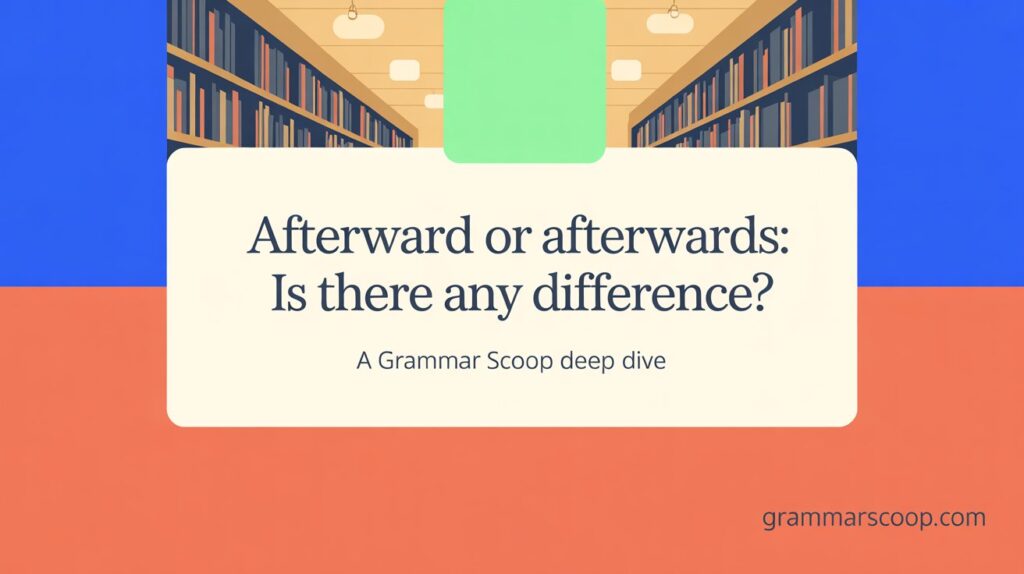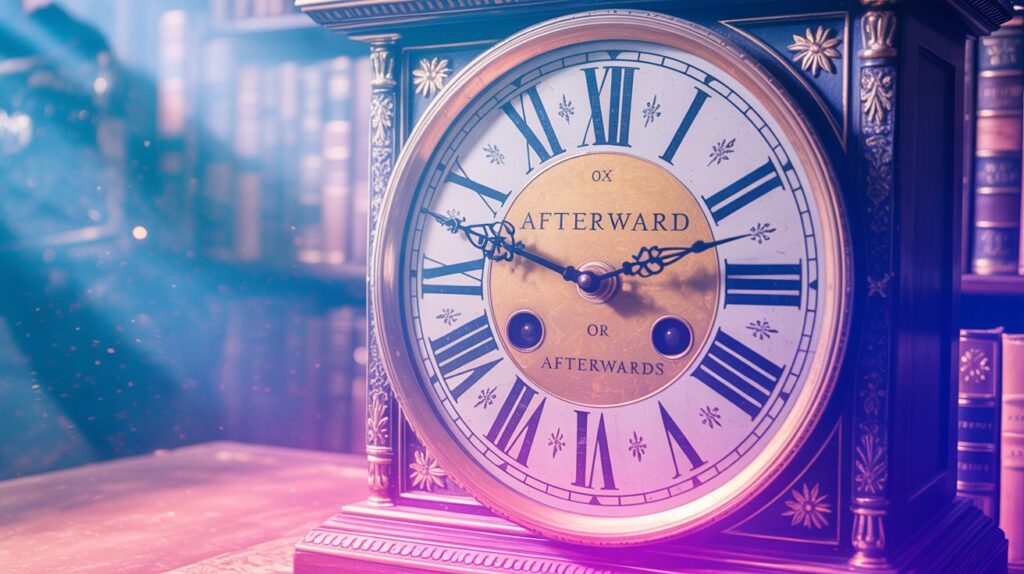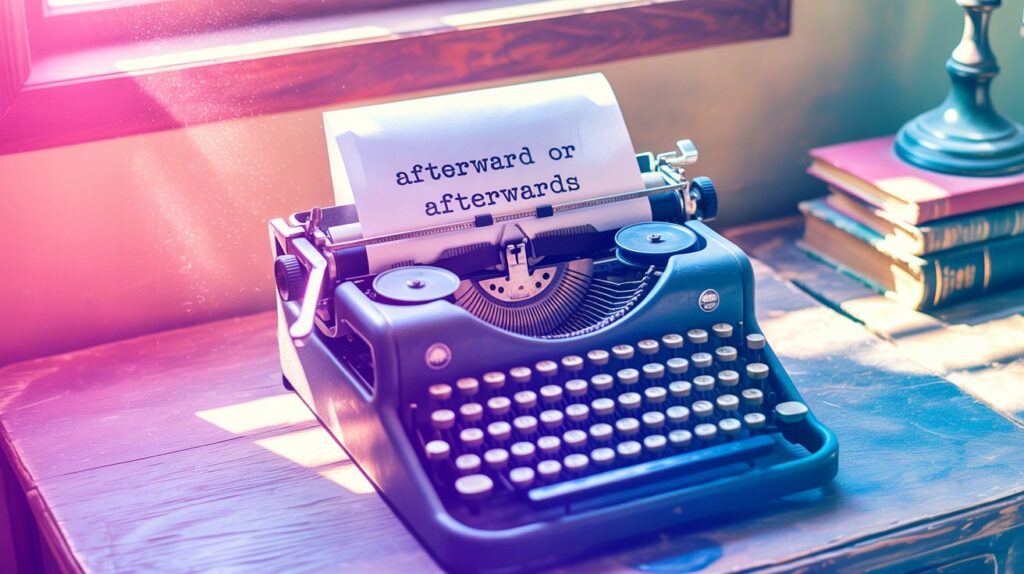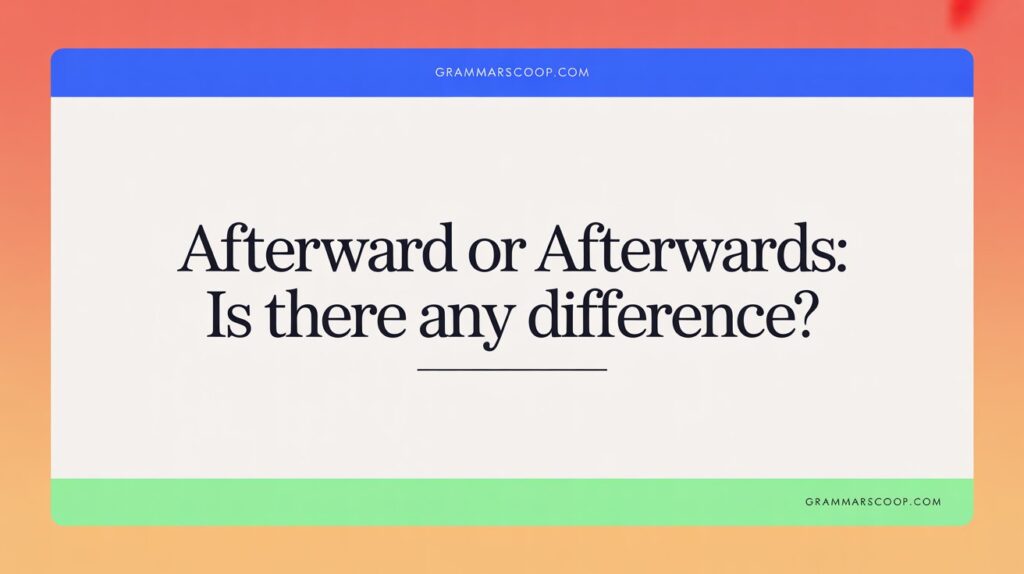Language is full of quirks, and few quirks spark more confusion than the subtle differences between two nearly identical words. Take for example afterward and afterwards. These words look and sound almost the same. They share the same root, the same general meaning, and—depending on where you live—are often used interchangeably. But is there a real difference between them? And if so, which one should you use?
This in-depth guide will help you finally settle the debate: “Afterward or Afterwards: Is There Any Difference?” We’ll explore their meanings, origins, usage in different English dialects, and how to choose the right one based on context.
Sure! Here’s the Quick Summary section in Markdown format:

Quick Summary
Confused about whether to use “afterward” or “afterwards”? You’re not alone. Both words mean the same thing—“at a later time”—and are grammatically correct. The real difference comes down to regional preference:
- “Afterward” is more common in American English.
- “Afterwards” is preferred in British English and other Commonwealth countries.
There’s no difference in meaning, only in style. So when choosing between afterward or afterwards, think about your audience and stick with one version for consistency. Whether you’re writing a blog, essay, or business report, either form is acceptable—just don’t mix them up in the same piece.
Need a quick tip?
Use “afterward” in the US, “afterwards” in the UK.
For deeper insights into usage, examples, history, and when to use which—keep reading.
Where the Confusion Begins

Most of the confusion stems from the fact that both words are correct. The difference between them doesn’t lie in definition, but in regional preference and stylistic convention.
Consider this:
“I’ll see you afterward.”
“I’ll see you afterwards.”
Both are grammatically correct. Both mean “at a later time.” Yet one is more likely to appear in American English, and the other in British English.
Tools like Microsoft Word or Google Docs may flag one as a mistake based on your region settings, but that’s not a sign of error—just a preference.
Definitions: What Do “Afterward” and “Afterwards” Actually Mean?
Let’s get the basics down. Both words function as adverbs of time, meaning they describe when something happens.
“Afterward” Meaning
Afterward is defined as:
Later; at a subsequent time.
Example:
“He graduated in June and started his job shortly afterward.”
“Afterwards” Meaning
Afterwards carries the same definition:
Later; at a subsequent time.
Example:
“We went to the museum and had lunch afterwards.”
So, if you’re wondering about the afterwards meaning, it’s essentially identical to that of afterward.
No change in tense, formality, or tone. The difference lies elsewhere.
“Afterward” vs “Afterwards”: Is There a Real Difference?

Strictly speaking, there’s no semantic difference between these words. That means their meaning stays the same, no matter which form you use. The only distinction is geographical and sometimes stylistic.
Here are the key differences at a glance:
| Feature | Afterward | Afterwards |
|---|---|---|
| Meaning | Later, subsequently | Later, subsequently |
| Used in | American English | British English |
| Formality | Neutral | Neutral |
| Tone | Slightly sharper | Slightly softer |
| Ending | -ward | -wards |
Important: Don’t confuse this with other word pairs where the “-s” ending adds a new meaning (like “toward” vs. “towards” where both also mean the same).
British English vs American English: The Real Divide
When deciding between afterward or afterwards, your location (or your audience’s) matters. British and American English differ in their treatment of direction-based adverbs.
In American English:
- “Afterward” is standard.
- “Towards,” “forwards,” and similar “-s” forms are less common.
- Example: “He left soon afterward.”
In British English:
- “Afterwards” is preferred.
- “Towards,” “forwards,” “backwards” are all widely used.
- Example: “They had dinner and went home afterwards.”
Other Similar Pairs:
| American English | British English |
|---|---|
| toward | towards |
| forward | forwards |
| backward | backwards |
| upward | upwards |
Bottom line: If you’re writing for a UK audience, go with afterwards. Writing for an American publication? Use afterward.
Explore further:
- Preexisting or Pre-Existing: Which One is Correct?
- What is Plural of Fox and What is Plural of Ox?
- Skill Set Or Skillset And Skill-Set: Which Is Actually Correct?
- Compare and Contrast: Definitions, Differences, and Examples
- What’s the Plural of Iris? Explanation with Examples
Which One Should You Use — “Afterward” or “Afterwards”?
There’s no wrong choice between afterward or afterwards, as long as you’re consistent and consider your audience.
Use “afterward” if:
- You’re writing in American English.
- You want a slightly more formal or concise tone.
Use “afterwards” if:
- You’re writing in British, Canadian, or Australian English.
- You prefer a flowing, slightly softer style.
Tips for Consistent Usage:
- Choose one and stick to it throughout your writing.
- Follow the style guide of the platform or publication (APA prefers “afterward”).
- Consider your readers’ expectations based on location.
“Is it afterward or afterwards?” Honestly, it’s up to you. Just stay consistent.
Examples in Real-Life Contexts
Seeing words in action makes things clearer.
Sentences Using “Afterward”
- “We went to the game, and afterward, we grabbed dinner.”
- “You can rest now and go to the office afterward.”
- “He returned from war and never spoke of it afterward.”
Sentences Using “Afterwards”
- “She smiled, and afterwards, she began to cry.”
- “We visited the castle, and afterwards took a walk in the garden.”
- “The movie was great. We talked about it for hours afterwards.”
Notice how they’re used interchangeably? You could swap either form in any sentence above.
Synonyms and Related Terms
Sometimes, using a synonym avoids repetition and adds variety.
Common Synonyms for Both “Afterward” and “Afterwards”
- Later
- Subsequently
- Then
- Next
- Thereafter
- Following that
Example:
“The lecture ended. Later, we discussed the main points.”
More Specific Alternatives
- In the aftermath (used when referring to consequences)
- In due course (used in formal writing)
- Eventually (slight delay implied)
“In the aftermath of the storm, the streets were flooded.”
Use these alternatives for variety or clarity depending on your sentence.
Etymology: Where Do These Words Come From?
Understanding the origin of these terms sheds light on why both forms exist.
Origin of “Afterward”
- Comes from Middle English “afterward”
- Derived from Old English “æfterweard” (meaning: in the direction of after)
- The root “weard” means direction or motion
Origin of “Afterwards”
- Developed from “afterward” by adding -s, common in British adverbs
- “-s” ending was used to form adverbs in Middle English, especially to indicate movement or direction
So both words share the same base, but evolved regionally with slightly different endings.
Language Trends: What Modern Usage Tells Us
How are these words used today across different regions? Here’s what data says.
Google Ngram Viewer (English Corpus 2000-2020):
- In American English books, “afterward” is used about 3x more often than “afterwards”
- In British English books, “afterwards” is still the dominant form
Online Usage & SEO Trends (Ahrefs/SEMrush):
- “afterward or afterwards” gets over 4,000 global monthly searches
- “afterwards meaning” gets over 2,000 monthly searches
- More people globally search for “afterwards”
Publishing Style Guidelines:
| Style Guide | Preferred Usage |
|---|---|
| APA | Afterward |
| MLA | Either (but consistent) |
| Chicago | Afterward |
| The Guardian | Afterwards |
Quick Reference Table: Afterward vs Afterwards
| Feature | Afterward | Afterwards |
|---|---|---|
| Usage Region | US | UK, Canada, Australia |
| Tone | Neutral/Formal | Neutral/Conversational |
| Style Preference | APA, Chicago | Guardian, BBC |
| Frequency (US Books) | High | Low |
| Frequency (UK Books) | Low | High |
Conclusion: Final Thoughts on “Afterward” vs “Afterwards”
So, is there a difference between afterward or afterwards? Technically, no. They share the same meaning. The variation is stylistic and regional.
- If you’re writing for a global audience, either is fine.
- If you’re targeting American readers, go with afterward.
- If you’re writing in or for the UK, Canada, or Australia, choose afterwards.
And remember: whichever you pick, be consistent. That’s the key to professional, polished writing.
FAQs
Q: Is it “afterward” or “afterwards”?
A: Both are correct. Use “afterward” in American English and “afterwards” in British English.
Q: Does “afterwards” have a different meaning from “afterward”?
A: No. The afterwards meaning is identical to “afterward”: at a later time.
Q: Are there other word pairs like “afterward afterwards”?
A: Yes. Examples include: toward/towards, forward/forwards, upward/upwards.
Q: Can I use both forms in the same document?
A: It’s best to choose one and stay consistent for professionalism.

Lisa Morris is a seasoned blogger and language enthusiast with a passion for making grammar simple and engaging. At Grammar Scoop, she shares clear, concise tips that help readers master the rules of English with confidence.






